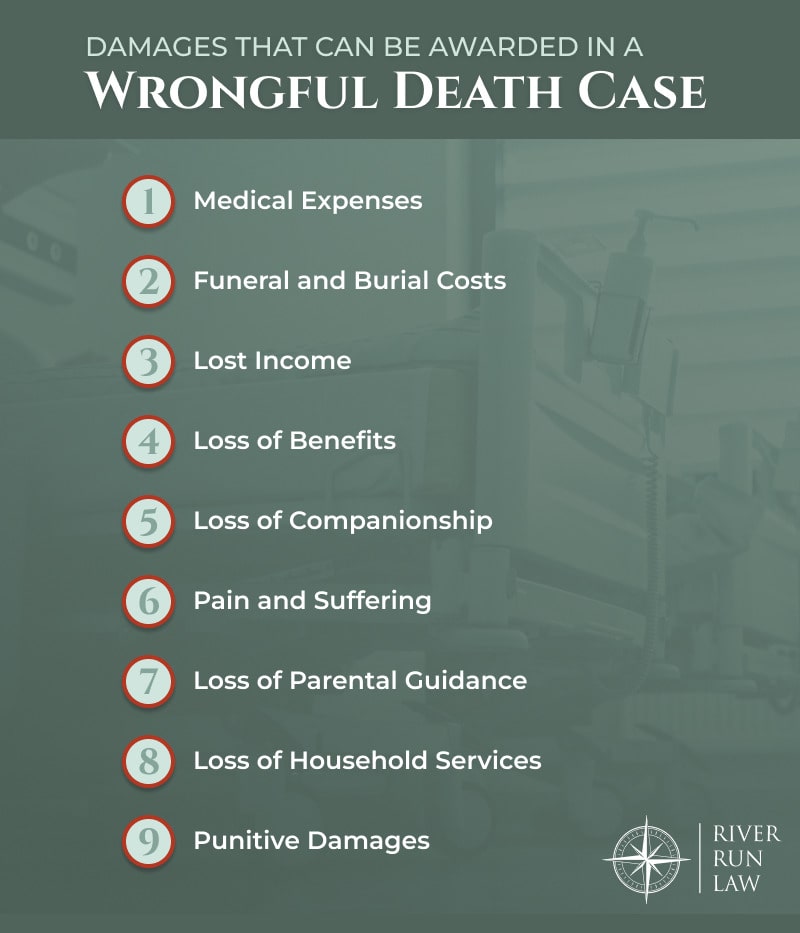Brooke graduated from the University of Richmond School of Law after receiving her undergraduate degree from the University of North Carolina at Chapel Hill. Brooke worked for five years in private practice with a law firm specializing in insurance defense litigation before becoming the trial litigator for Allstate Insurance Company in the metro Richmond area.
The unexpected and preventable death of a loved one often results in significant psychological, physical, and financial damages.
In an effort to address the financial aspect of these deaths, Virginia permits the deceased personal representative to pursue a wrongful death lawsuit.
Under Virginia Code § 8.01-50, “wrongful death” refers to a death resulting from another individual or entity’s wrongful act, neglect, or default.
The circumstances surrounding the death must be of the kind that would have permitted the person to pursue a personal injury lawsuit had they lived.
In this article, the Virginia wrongful death lawyers at River Run Law will go over the elements of a wrongful death claim. If you have questions or would like to know more, please contact us online today.
Elements of a Wrongful Death Claim in Virginia
Wrongful death lawsuits operate in the same way as most other negligence-based claims. As such, the at-fault party’s liability manifests in terms of monetary damages.
The plaintiff, usually the estate’s personal representative, must establish the elements of a wrongful death claim. These elements include establishing the following:
- Duty of Care: The representative must demonstrate that the defendant owed a duty of care to the victim.
- Breach of Duty: The representative must establish that the defendant breached their statutory duty of care to the victim.
- Actual or Proximate Causation: The breach was the actual or proximate cause of the victim’s death.
Although the personal representative must file the claim, any resulting compensation will go to the victim’s beneficiaries.
A Virginia personal injury attorney can ensure that the estate meets the wrongful death elements and secures a just outcome.
The Importance of Evidence in a Wrongful Death Claim
When pursuing a wrongful death claim, one of the most critical components is evidence. The plaintiff, typically the personal representative of the deceased’s estate, must prove the essential elements of the claim to secure a favorable outcome. Thorough, well-organized documentation is vital in supporting each aspect of the case, from establishing fault to calculating damages.
Types of Evidence Needed in a Wrongful Death Case
- Medical Records
Medical records are crucial in establishing the cause of death and whether it resulted directly from the defendant’s actions. Detailed hospital records, autopsy reports, and documentation from healthcare professionals can show the extent of the victim’s injuries and how they led to death. This evidence helps establish the “causation” element of the claim, demonstrating that the defendant’s breach of duty directly resulted in the victim’s death. - Witness Statements
Testimonies from witnesses, whether they are bystanders, emergency responders, or anyone with direct knowledge of the incident, can play a key role in establishing liability. Witness statements can help confirm the circumstances of the accident, the behavior of the defendant, and the immediate aftermath. Eyewitness accounts can significantly support the “breach of duty” and “proximate causation” elements by offering objective perspectives of the event. - Expert Testimony
In many wrongful death cases, expert witnesses are necessary to provide specialized knowledge that the average person may not have. For example, medical experts can testify about the cause of death, the expected outcomes of injuries, and whether the care provided was adequate. Accident reconstructionists might be needed in cases involving vehicle accidents to explain how the crash occurred and what factors contributed to it. Expert testimony can lend credibility and clarity to complex aspects of the case, helping to establish that the defendant’s actions directly caused the victim’s death. - Photographs and Video Evidence
Photographs of the accident scene, the victim’s injuries, or damage to property can all provide valuable visual evidence in a wrongful death case. Video footage, such as surveillance footage or dashcam recordings, can offer a direct view of the incident and is particularly helpful in demonstrating how the accident occurred or how the defendant acted negligently. - Police Reports
Police reports are often one of the first forms of documentation following an accident. These reports can provide an official record of the event, including the law enforcement officer’s observations, the parties involved, and any citations or charges that may have been issued. This can bolster the claim by establishing that the defendant violated laws or engaged in negligent behavior. - Financial Records
Financial records may be required to calculate the economic losses resulting from the victim’s death, such as lost wages, loss of benefits, and future earnings. These documents help demonstrate the financial impact the victim’s death had on their surviving family members, supporting the claim for damages related to loss of income.
The Role of Thorough Documentation in Strengthening Your Case
Having comprehensive and organized evidence not only strengthens the claim but also provides the foundation needed for a successful case.
The more thorough the documentation, the clearer the link between the defendant’s actions and the victim’s death. A well-documented case allows your attorney to present a persuasive argument in court, increasing the likelihood of securing the maximum compensation available.
In addition, clear, compelling evidence can help resolve the case without the need for a trial. Defendants are more likely to settle out of court if the evidence against them is robust and irrefutable.
If you’re pursuing a wrongful death claim, it’s important to work with a skilled attorney who understands the significance of evidence in proving your case.
At River Run Law, we have the experience to guide you through the legal process and ensure that the necessary evidence is gathered, documented, and presented effectively. Let us help you seek justice for your loved one.
Who Are Beneficiaries of Virginia’s Wrongful Death Claim?
Under Virginia Code Section § 8.01-53, statutory beneficiaries include certain family members defined by law. Statutory beneficiaries of a wrongful death claim include:
- The victim’s surviving spouse, children, or grandchildren (if the victim’s child is deceased);
- If there is no surviving spouse, child, or grandchild, the victim’s surviving parents, siblings, or dependent household relatives; or
- If none of the above beneficiaries are alive, the damages award goes to any surviving family member that Virginia intestacy laws authorize.
This process protects the rights of the statutory beneficiaries and ensures that the correct party recovers damages.
What Damages Can I Recover in a Wrongful Death Lawsuit?

After a favorable Virginia wrongful death lawsuit, the court orders the liable party to pay “damages” to the victim’s survivors or estate.
In Virginia, wrongful death lawsuit damages may include monetary compensation related to:
- Mental anguish;
- Loss of the victim’s guidance, companionship, and comfort;
- Loss of the victim’s income and benefits;
- Loss of the victim’s services, care, and protection;
- Medical expenses that the victims incurred because of the incident; and
- Reasonable funeral and burial costs.
In narrow instances, the court may permit punitive damages. These damages are available in cases where the plaintiff can prove that the at-fault party acted with “willful and wanton” negligence.
These cases require claimants to abide by strict procedural and substantive rules.
Calculating Wrongful Death Damages
Wrongful death claimants should consult with an attorney to determine the evidence they need to substantiate their claims for damages.
Typically, calculating damages in a wrongful death lawsuit is a complicated process that requires various types of experts.
A wrongful death attorney can help claimants secure the relevant experts to aid in calculating the extent of damages the law entitles.
Experts engage in a complex mathematical process to determine the victim’s financial contribution and the family members’ losses.
Subsequently, an experienced attorney can use these findings to make a compelling case for maximum recovery.
Time Limit on Filing Virginia Wrongful Death Lawsuit
Virginia Code § 8.01-244 requires that wrongful death claimants file their suits within the statute of limitations.
The statute of limitations for a wrongful death lawsuit is generally two years from the date the victim died. The court will likely dismiss cases that do not abide by the statute of limitations.
There are very few exceptions to the statute of limitations. However, the court may permit a lawsuit after the time period if the family member does not discover their loved one’s death until after their passing.
Moreover, an exception to the statute may be available if the claimant is a minor at the time of their parent’s death. In these situations, the claimant has until two years after their 18th birthday to file their wrongful death lawsuit.
FAQs About Wrongful Death Claims
Can I File a Wrongful Death Claim if the Deceased Had Partial Fault in the Accident?
Yes, it is possible to file a wrongful death claim if the deceased had partial fault in the accident, but it may affect the outcome. In Virginia, the state’s “contributory negligence” rule means that if the deceased is found to be even 1% at fault for the accident, their family may be barred from recovering any compensation. It’s important to consult with an experienced wrongful death attorney to evaluate how the law applies to your case.
How Long Does a Wrongful Death Lawsuit Typically Take?
The timeline for a wrongful death lawsuit can vary depending on the complexity of the case, the evidence available, and whether the case goes to trial. On average, it may take several months to a few years to reach a settlement or court decision. Working with an experienced attorney can help expedite the process by ensuring that all necessary evidence is gathered and filed promptly.
What Is the Average Settlement Amount for Wrongful Death Cases in Virginia?
The settlement amount for wrongful death cases can vary widely based on the circumstances of the case, such as the severity of the negligence, the victim’s age, and the financial impact on the family. While there is no set “average” settlement, cases involving significant losses and clear liability can result in higher settlements. An attorney can help estimate potential damages based on the specifics of your case.
Have Additional Questions About the Elements of a Wrongful Death Claim? Let Us Help You
If you recently lost a loved one in a tragic accident, you may be able to recover financial compensation from the person or people responsible for your loss.
The Virginia wrongful death lawyers at River Run Law have extensive hands-on experience pursuing significant compensation on behalf of grieving families.
We handle all types of wrongful death cases, including those arising from motor vehicle accidents, slip-and-falls, and workplace accidents.
To learn more and to schedule a free consultation, reach out to River Run Law at (804) 889-0500 today. You can also connect with us through our online contact form.
Related Posts
Where to find our Richmond office:



